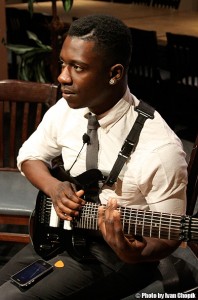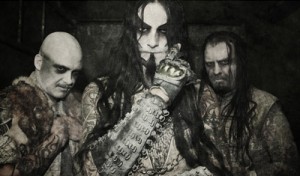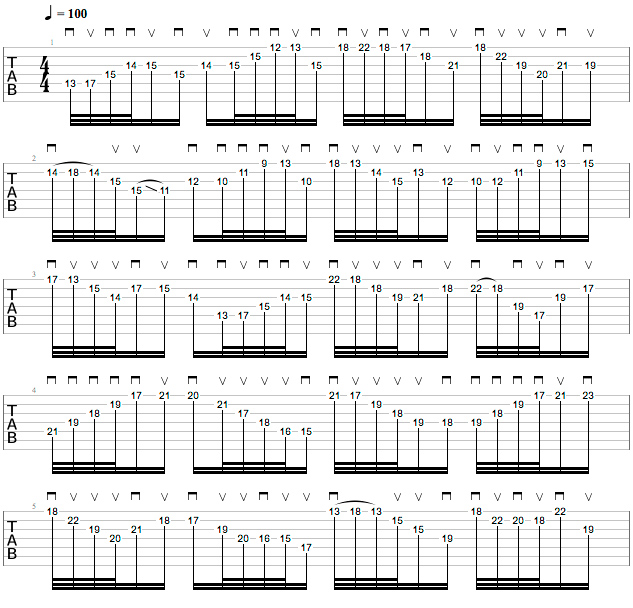At this year’s winter NAMM show in Anaheim, CA, I had a chance to speak with guitar legend Marty Friedman, who is known for his lead guitar role with metal pioneers Megadeth, his virtuoso supergroup Cacophony with Jason Becker, and his extensive solo career. Marty revealed some details about his upcoming album, Inferno, featuring his first collaboration with Jason Becker since the Cacophony days, shared his experiences of making music in Japan and throughout the world, and offered some heartfelt advice for guitarists looking to find success in today’s music scene.
In addition to his collaboration with Jason Becker, the upcoming album also features guest appearances from Rodrigo y Gabriela, Alexi Laiho (Children of Bodom), and David Davidson (Revocation), and others. You can listen to the album’s first single ‘Steroidhead’ (featuring Skyharbor’s Keshav Dhar and Anup Sastry) HERE.
IC: You’ve got a brand new album coming out this May. Tell me a little bit about it. What does it sound like?
MF: It’s called Inferno. I like to say that if you like my playing at all you’re really, really going to like it. But if you dislike my playing, you’re really going to hate it, because it’s the densest album I’ve ever done. It’s got the most Marty information on it; data of guitar, data of my playing, data of my way I think, the way I like to arrange, and my type of melodies.
 It’s the ‘Martiest’ thing you have ever heard. If there’s anything that bugs you about my playing you’re going to hate this record. But if you like it, I think you’ll definitely think it’s my best record, yet. I think it’s everything I’ve ever done, on ten.
It’s the ‘Martiest’ thing you have ever heard. If there’s anything that bugs you about my playing you’re going to hate this record. But if you like it, I think you’ll definitely think it’s my best record, yet. I think it’s everything I’ve ever done, on ten.
IC: I think with a few of your previous records you ventured more into pop writing and structures and less lead-oriented kind of arrangements. This is not the case here.
MF: I don’t know how pop this thing is, but it’s pretty sick, to use a word like that. I’ve done everything man. I tried to keep really focused on this record. Mainly, because this was the first record I’ve made in America in a long time, for an American record company, for a worldwide release. Rather than for a Japanese release, and then if it gets released elsewhere, then ‘so be it’ type of thing. This is a whole, worldwide type of thing.
Of course, I ask myself first, ‘what do I want to do the most?’ I also had to think that there are a lot of people that have been supporting me for many, many years that I haven’t been able to play for. ‘What do they want to hear me play and what do I want to play that they want me to play?’ It’s not like I’m trying to please everybody, but I’m trying to think of what would please them, that would also please me. This is something I haven’t really thought about for a long time.
It’s hard to explain. Basically, the difference is it’s not just for a Japanese market, it’s for everybody. It’s a ‘thank you’ to all of the people who have supported me outside of Japan for all these years and people who have written me off because I’ve only been in Japan for so many years.
IC: As you recall from your previous American releases, and then your Japanese releases, how do feel people perceive you differently in Japan, versus the U.S. and elsewhere?
MF: In Japan people know more of the current things that I’ve done, because I’m doing everything in Japan. I’m constantly exposed over there, so to speak; in Europe less so. I’ve done some solo tours in Europe and I’ve played the stuff that I’ve released in Japan in Europe… America even less than that. So there are a lot of people that might not know what I’m up to lately in America.
They might remember me from my previous bands, or if they have a really open mind and are very adventurous, they might dig in and find some of my Japanese stuff. For the mainstream, I think it will be a comeback of sorts in America. Which it feels weird to me, because I never really left, but I actually did leave. I haven’t done anything in America for a long time. How do you explain that? I have no idea what people are going to think. I just hope they love the record.
IC: For sure. Are you still living in Japan at this point?
MF: Yes, Tokyo.
IC: I know for a lot of people some of their favorite Marty material is you playing with Jason Becker back in the day with Cacophony. Do you ever think back to those days? Do you keep in touch with Jason? What’s that like?
MF: We are best friends, of course, and I actually collaborated with him on a song on Inferno. We did a song together despite his situation with ALS. He still came up with some beautiful music, which I arranged and played. I had a guy named Ewan Dobson play Jason Becker’s acoustic parts in the song. The song is just a full-out metal assault, Cacophony maniac kind of song, but there are some Jason-esque acoustic parts in there and I’m not that good on acoustic, so I had Ewan play that stuff. He literally had Jason’s spirit come through his guitar and it’s just like Jason and I are playing together – fantastic. I can’t wait until hear it.
IC: That’s amazing. So is this the first collaboration that you’ve done in a while?
MF: Yes – the first collaboration since Cacophony.
IC: Any piece of advice that you can offer to guitarists coming into the scene today, trying to make their mark, and find success in the industry?

MF: I’m assuming they’re already playing in bands and stuff like that. First of all, instrumental music – don’t even go there. Instrumental music is a tough genre. It’s the funnest thing to play, because you don’t have to deal with any singers. But in reality, it’s a very limited amount of people who can stand it. To be honest with you, I’m not a big fan of instrumental music, myself.
It sounds hypocritical for someone who’s released so many instrumental albums, but I think that’s the standard to which I make my instrumental music. It’s like for someone who can’t stand instrumental music; it has to be at this level of stuff. It’s far beyond showing your chops and showing what you can do. And the worst thing is how versatile you are, because I don’t want to hear a country song, a blues song, a metal song, a rap song all on the same album. A lot of instrumental guys tend to do that because it’s like a résumé, which is fine for a résumé, but not for a listening album.
To develop your own identity as a guitarist, it’s fun to do instrumental stuff, but get into a band. I love playing in a band the best. There are four songs on my new album Inferno with vocals, so it’s a band vibe on some of it. It’s almost like Cacophony, [which] had some vocal songs and some instrumental songs. Sort of like that, but there are more instrumentals on Inferno. Bands are where it’s at… the more you play with your band the more identity you will have as a guitarist. Instrumental music is kind of a dead end street.
I hate to be negative but these are the realities. There are only so many people who want to listen to that much guitar and most of them are guitar players. Another thing – guitar players don’t even like to listen to guitar players. I’ll tell you, if I hear some fantastic guitar player, I’m either jealous that he’s so good and I can’t do that, or I think I don’t like what he’s doing and I would never do it that way; I just don’t like the way the guy plays. Those are the only two options. I rarely hear a great guitar player go, ‘I like it, I want to listen to it.’
I either wish I could play like that, or I don’t like the way this guy plays. It’s like that. It’s weird coming from me, [but] this is honest. This is weird coming from me because… the people who love my music, a lot of them are guitar players. I love your support and I appreciate all that. The reality is, the more you can fit yourself into a band context the better you will be for the long run, and the better you will be for the more experiences you’ll have. If I was only doing instrumental music I think I would pull my hair out.
There’s a time and place for it. When I do it, you can bet that there’s no stone unturned. It’s going to be the rad stuff and it’s definitely not a showoff type of thing and it’s not an arrogant type of thing. I’ve been making instrumental music; some people expect that from me. So if I’m going to do it, it’s going to be something even I’m happy to put out. My advice is, collaborate with as many people as you can. Play in a band. Being by yourself, doing everything by yourself… unless you’re someone like Prince who’s a god, I wouldn’t want to put all that work on you. Be part of something great.
IC: Closing out, do you have any words for your fans and listeners?
MF: Thank you very much. I hope you like the new record. I’m going to be on tour this year to play for as many of you as possible. And I love you. Thank you very much!
[Special thanks to Chris Dingman and Alexander Pierce for their fantastic video work!]

















